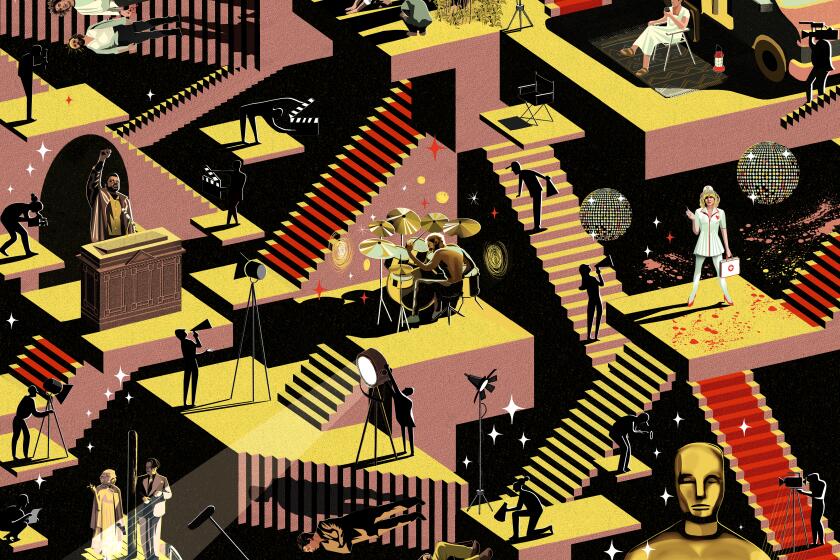This year’s Oscars had cinematic flair and a grand setting. Too bad they couldn’t reshoot that ending
- Share via
There was no question that the 93rd Academy Awards, broadcast Sunday on ABC, would be unique. That’s just how it goes in these pandemic times. What you get is never what you’ve gotten, and what you get is what you get.
Not every COVID-19-conscious awards show has been successful, but generally speaking, they have been at least as good — and as frustrating, as tolerable, as overlong — as the pre-pandemic variety. And for better or worse, they have been unavoidably novel, having to invent new approaches to shows that for years and years have barely differed.
It was an interesting move to turn the show over to an actual filmmaker (and notable dabbler in television), Steven Soderbergh, who produced alongside film producer Stacey Sher and Jesse Collins, a television producer with awards show experience; Soderbergh intimated beforehand that the broadcast would be like “a movie,” and on a technical level, it could lay some claim to that — the image was letterboxed for a wider screen and processed to look more filmic, which actually dulled the image and made a live event feel less so. In a bid for elegance, the broadcast courted sluggishness.
In contrast to the unpredictable mix of home-bound glamour, casual Friday and ready-for-bed-wear that characterized the Zoomed-in Golden Globes, the 2021 Oscars did offer a roomful of people dressed to the nines. And the choice of Union Station as an alternative site was inspired if little mentioned. It’s one of the city’s great landmarks, a fantasy based in regional building traditions, lifestyles and mythologies. It was also built at a time, 1939, when nearly every American movie was made in Hollywood, whatever part of the world it meant to represent.
“Nomadland” takes home the best picture, director and lead actress awards at the 2021 Oscars.
The opening segment consisted of a tracking shot of Regina King grabbing a statuette and striding from the decorated courtyard where a preshow gathering and interviews had taken place, through the station’s main hall to where a terraced supper club had been superimposed over what was originally the station’s ticket counter. Titles over this sequence suggested the opening of a film; graphics throughout were unusually elegant. As first speaker, she became the de facto host of this supposedly hostless Oscars. (Tripping, she said, “Live TV, here we go.”)
“We are mourning the loss of so many,” she said, getting right to a point. “And I have to be honest, if things had gone differently this past week in Minneapolis, I might have traded in my heels for marching boots. I know that a lot of you people at home want to reach for your remote when you feel like Hollywood is preaching to you, but as a mother of a Black son, I know the fear that so many live with, and no amount of fame or fortune changes that.” Given the historical diversity of the year’s nominees and winners, and the subject matter of many nominated films, it would be a continuing theme throughout the evening.
Toward the end of the show, the awards came in a new order, with best picture notably preceding the awards for lead actress and actor. (I couldn’t help but wonder if this was on the theory that Chadwick Boseman would posthumously win for “Ma Rainey’s Black Bottom” — it would have been a big finish, certainly bigger, as television, and one might say “thematically,” than the quick acknowledgment of an absent Anthony Hopkins, and curtain.) There were no production numbers, apart from King’s walk to the stage, almost no scripted comedy — which some will account a good thing — no montage salutes to filmmaking craft.
At the same time, the stated aim of the evening was to address “stories” about filmmaking and filmmakers. Introductions of each nominee, in every category, came with a little bundle of facts that reminded me of nothing so much as the late Alex Trebek greeting the contestants on “Jeopardy!” They flew from the mind like dead leaves in a light breeze.
With a movie industry upended by the pandemic and growing pressures from streaming plus the push for diversity, the Oscars found meaning. But will the show find an audience?
In the time they saved, speeches were given priority, and it was pleasant not to hear the winners played off for going long — it’s their night, after all — which is always a reminder that you’re stuck inside the ecosystem of commercial television. And, as always, the speeches could be sweet or poignant or goofy or fiery (in a mostly muted way). At the same time, you could see a certain logic in the old practice of asking nominees to figure out how to say their piece in 30 seconds.
It was a slow night, but one whose rhythm you could adjust to, brought alive by occasional bursts of energy. There was Glenn Close wriggling to “Da Butt,” having demonstrated her suspiciously deep knowledge of go-go group E.U., capping a rather wayward Oscar song trivia bit featuring broadcast DJ Questlove and comedian and actor Lil Rel Howery. There was lead actress winner Frances McDormand howling like a wolf. Tyler Perry, accepting the Jean Hersholt Humanitarian Award, was lit up, traveling from an encounter with a homeless woman to his mother’s experience of Jim Crow to a call to “anyone who wants to meet me in the middle, to refuse hate, to refuse blanket judgment and to help lift someone’s feet off the ground.”
The audience stood up for that. It’s been that kind of year.
More to Read
The complete guide to home viewing
Get Screen Gab for everything about the TV shows and streaming movies everyone’s talking about.
You may occasionally receive promotional content from the Los Angeles Times.








